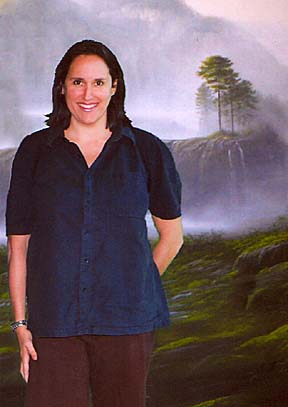|
Dusty Dog Reviews The whole project is hip, anti-academic, the poetry of reluctant grown-ups, picking noses in church. An enjoyable romp! Though also serious. |
|
Nick DiSpoldo, Small Press Review (on Children, Churches and Daddies, April 1997) Children, Churches and Daddies is eclectic, alive and is as contemporary as tomorrow’s news. |



|
Kenneth DiMaggio (on cc&d, April 2011) CC&D continues to have an edge with intelligence. It seems like a lot of poetry and small press publications are getting more conservative or just playing it too academically safe. Once in awhile I come across a self-advertized journal on the edge, but the problem is that some of the work just tries to shock you for the hell of it, and only ends up embarrassing you the reader. CC&D has a nice balance; [the] publication takes risks, but can thankfully take them without the juvenile attempt to shock. |
Volume 222, July 2011
Children, Churches and Daddies (cc&d)
The Unreligious, Non-Family-Oriented Literary and Art Magazine
Internet ISSN 1555-1555, print ISSN 1068-5154

see what’s in this issue...
Note that in the print edition of cc&d magazine, all artwork within the pages of the book appear in black and white.
|
Order this issue from our printer as a a digest-sized paperback book (5.5" x 8.5") perfect-bound w/ b&w pages You can also get this from our printer as a a ISBN# paperback book (6" x 9") perfect-bound w/ b&w pages “Exploding on the Scene” |

poetry
the passionate stuff
Seeing Golodbuggy’s machos on my shelfFritz Hamilton
Seeing Goldbuggy’s matzo’s on my shelf/ I
slip in beside the matzos trying
become the zebra Doodledeyaba proud of
sing the blues/ it
all too boring, so anything to amuse/ I
become a jailbird with wings &
fall into the Colonel’s pot/ it’s
more I’m free, but I hallucinate I’m God, &
take me to detox in her matzo box/ they
I’m a humble bum, a
live in the matzo box till
don’t wear !
|
Medical progress? We live forever!Fritz Hamilton
Medical progress? We live forever!
the television we watch all day, as
our lips & the resentment they hide with
bring our breakfast & remove the potty from !
|
“APPROPRIATE” (Rated G)CEE
Those 50’s fright film trailers?
|
MistressJe’free
She snuck into your wallet
She laid back in bed beside you
Will she be forgiven
She spoke to the dolls
Her fierce kisses, insecure -
|

Audrey, painting by Brian Forrest
Taxing Policy: The
I.B. Rad |

“and Then, in Force”, art by Rose E. Grier
Prime Times and Prime QuestionsMichael H. Brownstein
can 7/12’s be a prime number
|
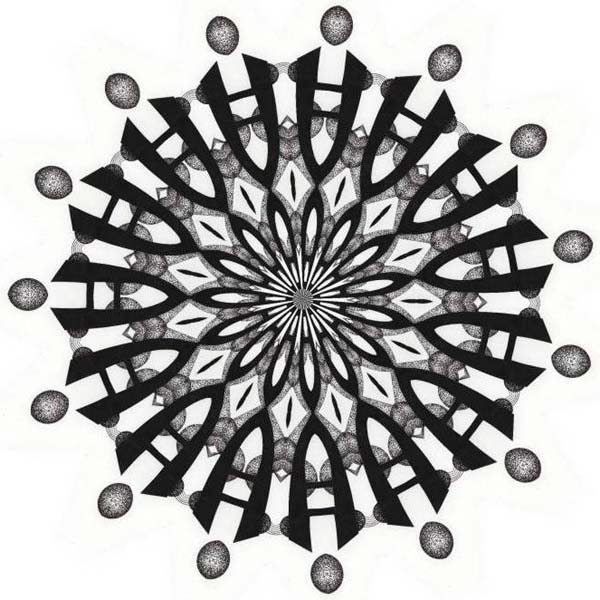
19-10-2010 VHK, art by Üzeyir Lokman ÇAYCI
The Lady’s a ChameleonMel Waldman
The Lady’s a chameleon with golden or jet black
with her young silky skin. Yet sometimes she is
Beware! When she smiles at you, look the other
for she is a femme fatale. She is the Darkness She’s the Lady.
|
BIOMel Waldman, Ph. D.
|
Time spaceJermaine Harmon
I recall being born a man but I graduated
My name is me, and I was born |
Jermaine Harmon BioJermaine Harmon enjoys going to the dentist, loves mashed potatoes and supports gay marriage. Harmon received two things while living in New York City 1) his MFA in creative writing from The New School, and 2) his first real broken heart. He has had poems published in Tableau and Sandstorm. After graduating from The New School, Jermaine was chosen to participate in the Cave Canem regional workshop lead by Jacqueline Jones LaMon. He is currently living in an oil and church town named Midland, TX getting fat and writing poetry – plotting a returning to New York in the near future to pursue poetry full-time
|
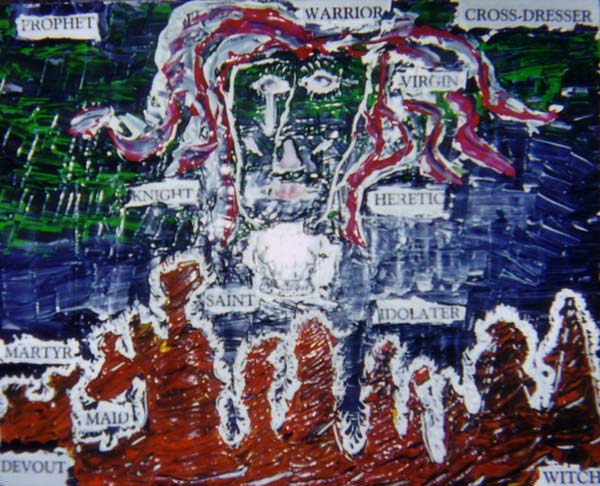
The French Inquisition, art by Aaron Wilder
How Many MoreJohn T. Hitchner
In the church of my youth,
Wall plaques raised two-dimensional Stations
“Why?” we asked our teachers and ministers.
Jesus the Good Shepherd tended his flock,
The next day
Now we remember where we were
How many more candles must we light,
|
�John T. Hitchner bioJohn T. Hitchner is a graduate of Glassboro State College (now Rowan University) and Dartmouth College. He has also studied at the University of Bath in the United Kingdom and at the New York State Summer Writers Conference. Presently, he teaches Coming of Age in War and Peace at Keene State College, Keene, New Hampshire.
|
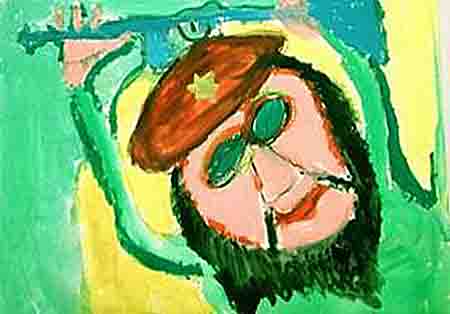
New Man, painting by Jay Marvin
How I Loved Myself On DrugsAndy Roberts
Oxycontin, oxycodone, hydrocodone,
Down below the pine line, listening for southern accents,
The bottle let me down.
Toadlickers, gluesniffers, paint thinners, mouthwash, aftershave,
|
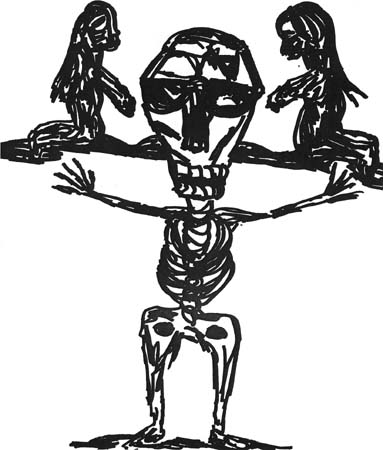
Pray for the Dead, art by Edward Michael O’Durr Supranowicz
As Disraeli Gears PlaysLawrence Gladeview
conversing
have you ever
noshing on
nope
|
Lawrence Gladeview BioIn 1983, Lawrence Gladeview was born to two proud and semi-doting parents. After two middle schools and losing his faith in catholic high school, he graduated from James Madison University, majoring in English and having spent only one night in jail. He is a Boulder, Colorado poet cohabiting with his fiance Rebecca Barkley. Lawrence is one of two editors for MediaVirus Magazine, and more than sixty of his poems have been featured, or are forthcoming in various print and online publications. You can read more of his poetry on his website, Righteous Rightings.
|
The Life Of The Living DeadCaleb Yarborough
This is the day in which the LORD has made.
Since I’ve grown up, these problems have only intensified.
With the shame of my illness, I avoid people at all costs.
So to those who do not believe me, let me words some day come
|
Dead BeatsRoger Cowin
1.
2.
3.
4.
5.
|
Pretty Lady’s DaughterCherese Eudlyn Nelson
Civil rights
|
Just Can’t BreatheJanet Kuypers12/14/10
in memory of my Uncle Pete
over the years
and when I’ve felt
I know this sounds selfish
I’ve served my country
this torment follows me wherever I go
I need to take a nap
will I gasp for air
or will I know that you’re right
|
| Janet Kuypers reading her poem Just Can’t Breathe |
| Rather read it? Then read the original writing |
 Watch the YouTube video
Watch the YouTube video |
on a spring dayStephanie Kaylor
in the garden my daughter’s
lightly, as if avoiding inflicting
too young to know her body
the iron muscles this world pumps
white sundress, to know one
She smiles as the ferns graze
running thick in the lazy morning
wonder if the smile I too feel
that I cannot face the truth,
|

prose
the meat and potatoes stuff
The New York City Bus<Anne Turner Taub
Simon Berry was a loner. It was understandable. He had been the only child of two elderly parents who had tried their best not to ignore him, but were not very successful at it. At times they left him home alone, having forgotten that he even existed. But he was not an unhappy child. He did not mind being alone, never felt lonely. As a child he had friends, well, not really, and as an adult he had even less. But he was a very calm, not at all unhappy, person. In fact, people were amazed at his calmness, “How can you be so quiet, so calm, after this happened,” or “that happened”.
|




Stuffed in the FutureWes Heine
For all levels of class it is now the custom to have the remains of the dead stuffed and kept around the house to be honored. Some aging folks even opt to die early at local Assisted Suicide Clinics to look their best when propped up on the couch, in the corner, or packed into the closet with dozens of generations with honor.
|

The Trolwerks, art by Mark Graham
The HaremJohn Duncklee
On a rather cool evening in November one of the most famous western writers of all time stepped out from the airport terminal building and into the limousine furnished by the Heber City Writers of the West to bring him to their annual convention. He arrived by invitation to be the keynote speaker to the hordes of writers and wannabe writers attending the annual event for its second anniversary. Along with his luggage containing all his needs for the weekend, he carried another valise full of brand spankin’ new copies of his latest book. The convention committee had made a generous offer to reimburse him for his time and effort to be their keynote speaker, but he was not about to overlook the opportunity to sell as many books as possible during the weekend event. Arriving at the convention hotel, he saw attendees lining the entrance, smiling broadly with awe and adoration at his presence. Most of these onlookers carried clip boards and pens in order to capture every word the famous western writer spoke during his stay in Heber City.
|
Benny and the BadgerBob Strother
Jake stood in the middle of the nearly empty room, her eyes drifting from the nail holes in the wall to the yellow chintz curtains still hanging brightly from the windows. Both were reminders of all she’d lost. She felt cold, hollow, not sure if it was the rain coming down in sheets outside or if she’d just settled into the bleak reality of a life without—
Jake and Megan had been together for five years. Four years of college in Colorado, studying aeronautical maintenance, and one year after they’d moved to northern Georgia—the happiest years of her young life. It hadn’t mattered that neither of them had been able to find work in their field. They’d gotten jobs at Target, minimum wage at first, but Jake had worked hard and, before the year was out, she was on the management track. It hadn’t been about a career. For her, it was just about love and being able to provide for her partner.
Mini-tsunamis from passing big rigs crashed onto the car’s windshield, interrupting the hypnotic thump of the wiper blades, each wave a painful reminder of the tears Jake had shed over the past few weeks. She sat slumped in the passenger seat, head resting against the glass, struggling desperately not to think.
Somewhere northeast of Knoxville, they stopped at a convenience store. While Ben went inside, Jake slipped one of the photos from the box on the back seat. It was of her and Megan at their graduation ceremony, smiling into the camera. She wished she were back there—that she could reverse time, do things differently, make amends. As she replaced the photo, she noticed the small book with the colorful cover, a children’s book, Benny and the Badger. She pulled it out and was flipping through the pages when Ben returned with sodas and snacks.
The rain ended somewhere in Virginia, and darkness settled over the Appalachians like a purple blanket. Jake slept fitfully, interrupted by visitations from her former lover—laughing, pouting, sensuous, and finally, the dispassionate, indifferent Megan that had moved in with a boy from the store. Jake awoke to find her cheeks wet. She wiped her eyes with a sleeve and asked, “Where are we?”
They got coffee at a drive-through outside of Charleston, West Virginia, and chatted to help Ben stay awake. He carried most of the conversation, and Jake was okay with that. It kept her from thinking so much.
Jake guessed the confession was balm for her soul because she fell asleep again, and this time it was without Megan’s troubling specter. When she awoke, they had picked up I-78 in Pennsylvania and were closing in on the Garden State. Bands of pink light lined the horizon and tractor-trailers whizzed by like angry hornets.
|
In PassingBillie Louise Jones
She never really fell in love, not what she thought of as love, what everyone thought of as love: a glorious losing of herself in a boy. No matter how much she liked a boy, he was never life to her. There was no one she yielded her mind to, put above herself to serve and forget all else for. Always, some part of her was detached, so she thought she never was in love. If she did not have to give up so much of herself, it might be easier to fall in love. As it was, she drew a dream man out of books, a Renaissance man like Sir Phillip Sidney. The dream was of an adventurer-scholar, a type she knew did not exist in nature.
|
Fatal SecretStephanie Fleming
No one ever seems to talk much about colons. I imagine most people know they have one but it’s never a popular topic of conversation. I’ve never heard anyone say, “I don’t feel well; I think something is wrong with my colon,” or “My colon aches, I must have eaten some bad seafood.” But the colon plays a very important role in digestion and it would be hard to live without.
I’ve missed too much school to try to go back and I don’t want to go with these tubes. I’ve taken a part time job editing for an on-line medical journal. With my two years in medical school, the job is perfect for me and I can work from home. I feel weak and the three hours a day I work is all I can handle anyway. Right now I am editing an article about Crohns Disease and Ulcerative Colitis. I wish I had read this five years ago when my symptoms started. I had never even heard about either disease back then and I used to love to read health magazines and women’s journals. I thought I knew everything about women’s health. I was so wrong.
Tomorrow my best friend, Ashley, is coming over so we can spend some time together. She saw me in the hospital but doesn’t know how serious it is. I have to find a way to tell her I am dying and a way to say good bye to the best friend I have ever had.
|
The WorldShaun Corley
“Slow down Mike,” his mother said. “You’ve got plenty to time before your Pappy arrives.” She turned back to the small, white television on the kitchen counter. Mike Schrader shoveled another spoonful of Cookie Crisp into his mouth, while she wasn’t looking. If he wanted to play with his He-man toys before Pappy arrived, he had to hurry.
|
I’m an Abyss in MotionBing Liu
The psychiatrist has me sit on a day-bed. It has a hard leather material with a slight softness near the middle, where countless other patients must have lain. The psychiatrist has a peppery mustache and a pair of thin-framed glasses. He has a brooding serious face that he wears when he asks me to tell him the problem.
|

Books and Bareback LoveJonathan Seipp
I read so few books that when I finish one I feel queasy. It’s like I watched something die when I could have done more to help it.
|

RoommatesA. A. Garrison
Ben crouched intently over the toilet bowl, as if it held something of great interest. It had happened again. Teresa. Just yesterday he’d told himself never again, he was through with her. Then she’d come around tonight, horny as always, and he’d done her. His stepmother. Again.
The next morning, Ben slouched at the breakfast nook, entertaining a super-size bowl of cereal. He’d vomited himself hungry, it seemed.
And now it had happened again. Again. He’d lost count of both how many times they’d been together and how many times he’d sworn off her. The thought made the cereal do cartwheels in his stomach, and he turned abruptly from his bowl, patting his chest.
The morning crawled past, and a jeering loneliness reared its head, becoming enemy. Ben had been alone these last six months, but the difference today was that he felt alone — a world apart from merely being so. There was a morbid sense of being cut off, set adrift in a degenerate personal sea that no one shared. His problems crowded him everywhere he turned, each a brick in his wall. His friends had respectfully allowed him to withdraw following Jim’s death, and except for a few polite phone calls, they might as well not exist. Ben would every now and then think of calling them up — Rod, mainly, a sometimes-bassist he considered a good friend — but it was just too awkward, not to mention delicate. He didn’t trust himself not to blab about Teresa, and he couldn’t risk having that in circulation, not for all the companionship in the world. He felt removed from society, perhaps humanity; it was how he imagined a convicted child-molester must feel.
Ben lay in bed, the sheet at his waist, the room dark save for a nightlight leftover from childhood. His bedroom was spartanly bare, just the double bed he’d had since forever, a writing desk, a dresser, and a couple cheap lamps. He used to have an acoustic guitar set out, but he’d put it away last winter. There was a foreboding to the room tonight, as if he were awaiting execution. He kept seeing Teresa making her entrance, ready to fuck him to sleep, only to blow up in disappointment upon being denied. What do you mean, no? she would spit, assuming the traditionally male role of aggressor. He could see her doing that; she had a dominant, masculine streak in her, especially in bed, which Ben liked (though he would never admit this, even to himself). He scratched his face though it didn’t itch.
He awoke refreshed, a state alien to him these sordid six months. For a second he thought his and Teresa’s tête-à-tête was just a dream, as any significant event does in the twilight that precedes full wakefulness. Then he noted the marked lack of guilt staining his mind, and he knew it was real. He rolled out of bed and dressed, with a vigor almost childlike.
|
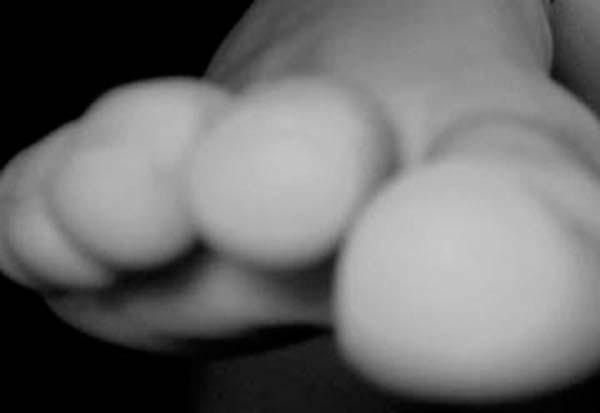
Her Toes, art by Cheryl Townsend
ApproximationRochelle Cartier
“What about that new guy you’re seeing? Why don’t you bring him with you for Easter dinner? Your sisters and I would love to meet him.”
He was wearing her favorite shirt, a plain polo, unadorned by any logo, almost as gray as his eyes. He saw her coming and waved, a smile stretching across his face as she approached the park bench, their park bench. His fair hair appeared illuminated, the sunlight dancing on each strand. Natalie had never seen anything more perfect in her life.
She arrived four minutes late. The auditorium was filled to capacity, but Natalie preferred it this way. She located the last of the empty folding chairs that had been assembled along the back wall. She scanned the stage and found Sam, managing to make eye contact with him through her dark sunglasses. Natalie was complacent to let them rest on her nose, privately pleased that her anonymity could be somewhat preserved.
|
Because Of YouMeghan Frank
We sat down backs to the fridge feet on the cabinets. Mellissa was putting nutella on some sort of cookies; Eric and Randy were watching Steven play some stupid golf game on the xbox. We were just talking shooting the shit, when I saw something in your eyes, something was wrong. I asked you what was wrong, you responded, “Do you promise, no, swear not to tell anyone?” I agreed. “I’m going to die” you told me, “I’m not going to be back next semester, in fact I’m going to be dead by Christmas. I haven’t registered for classes, I’ve stopped going to classes, and I’m just not giving a fuck anymore.” I asked you why you were going to be dead, genuinely worried. “I have a disease. Its incurable. The doctors say its not good, I’m not going to make it to Christmas. That’s why I make jokes about not having long to live. Please don’t tell the others, I don’t want them to worry about me.” I agreed.
You knew. You knew that because I had done it before I would be helpless to help you. You knew that if you told me I wouldn’t be able to do anything. Just after thanksgiving you told me you weren’t coming back. You told me you’d be dead by Christmas. You told me you were sick, that you had been diagnosed with an incurable disease. Depression is not an incurable disease. You told me. You can’t tell me goodbye, but you can tell me your going to die? And I can’t tell anyone because I don’t want to be blamed for not stopping you. You’ve left me with this giant burden that I can’t share. After all of our conferences and telling me I was like your little sister you...
|

Dark, art by Peter LaBerge
(who also has artwork at flickr)

Philosophy Monthly
(justify your existence)
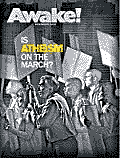
Who is on a Crusade here?Janet Kuypers12/30/10 Note: all italicized passages are quotes from other sources. (Because these passages often contain quotes from others, we have chosen it italicize large blocks of quotes from other sources.)
Periodically a pair of Jehovah’s Witness women come to my door to give me pamphlets, and every time I come to the door I have a phone in my hand because I am busy working. They see that I am busy, give me copies of Awake! and The Watchtower, I thank them profusely, and they go on their way.
Part One: ATHEISTS on a CRUSADE
Part Two: HAS SCIENCE DONE AWAY WITH GOD?
So before I went to the subheading: How Did the Laws of Nature Arise, I went on line to see if there was any more data about this article, and the first thing I found was an article from Atheist Geek News about the magazine article (available online at http://www.atheistgeeknews.com/from-the-awake-magazine-has-science-done-away-with-god-1578.htm). “The Atheist Geek” points out that real scientists don’t agree with Flew’s interpretation of the data. But the one important point I missed that Atheist Geek News included was that readers [of Awake!] are salivating at the opportunity to tell atheists like myself that it was science that gave a prominent nonbeliever like Flew his change of mind rather than blind faith.
Ah, but now we get to
A later article asks: A WORLD WITHOUT RELIGION—AN IMPROVEMENT? Questioning whether or not war would cease to exist. Although many evils have been done historically in God’s name, many atrocities have also existed without religion as a defined base.
|

Debra Purdy Kong, writer, British Columbia, Canada I like the magazine a lot. I like the spacious lay-out and the different coloured pages and the variety of writer’s styles. Too many literary magazines read as if everyone graduated from the same course. We need to collect more voices like these and send them everywhere.
Children, Churches and Daddies. It speaks for itself. Write to Scars Publications to submit poetry, prose and artwork to Children, Churches and Daddies literary magazine, or to inquire about having your own chapbook, and maybe a few reviews like these.
what is veganism?
vegan action
MIT Vegetarian Support Group (VSG)
functions:
For More Information Please Contact: Deborah Anderson dja@crest.org or (202) 289-0061
 
|
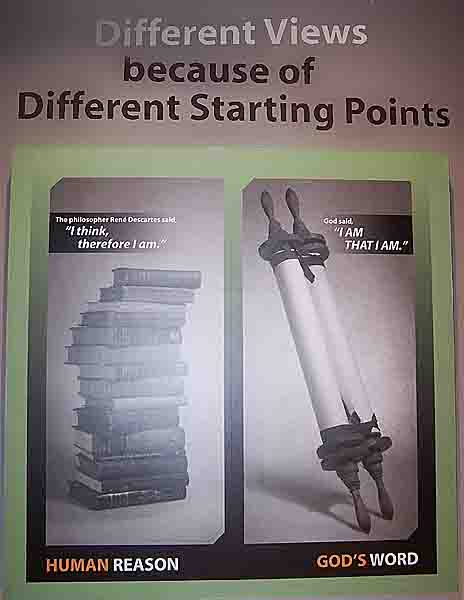 As I read this article, it went on to make points I have already discussed, about how humanity started on this planet. “The Atheist Geek” states: The article [Has Science Done Away with God, in Awake!] makes another small misstep when it tells us that Flew “became convinced that the universe, the laws of nature, and life itself could not have arisen merely by chance.” Actually, this is something that theists, deists, atheists, and scientists can all agree on. To my knowledge, the scientific community has never told us that these things came about “merely by chance.” That’s a huge (and convenient) oversimplification. The real truth is that scientists still aren’t sure how the universe began, so no one is saying too much definitively about it at this point. Except creationists, that is.
As I read this article, it went on to make points I have already discussed, about how humanity started on this planet. “The Atheist Geek” states: The article [Has Science Done Away with God, in Awake!] makes another small misstep when it tells us that Flew “became convinced that the universe, the laws of nature, and life itself could not have arisen merely by chance.” Actually, this is something that theists, deists, atheists, and scientists can all agree on. To my knowledge, the scientific community has never told us that these things came about “merely by chance.” That’s a huge (and convenient) oversimplification. The real truth is that scientists still aren’t sure how the universe began, so no one is saying too much definitively about it at this point. Except creationists, that is.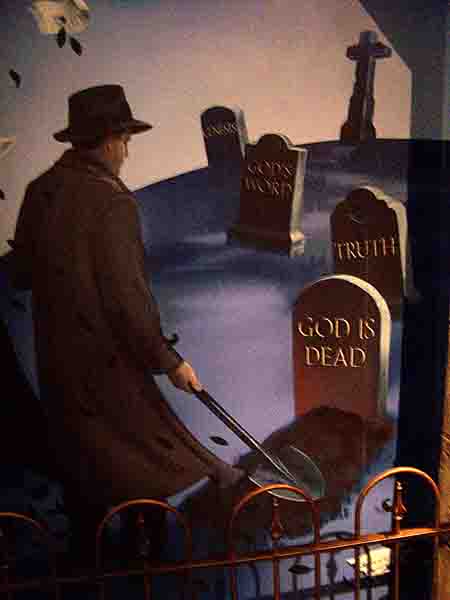 Part 4: Luck as the First Cause—Good Science?
Part 4: Luck as the First Cause—Good Science?
